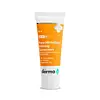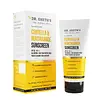What's inside
What's inside
 Key Ingredients
Key Ingredients

 Benefits
Benefits

 Concerns
Concerns

 Ingredients Side-by-side
Ingredients Side-by-side

Water
Skin ConditioningEthylhexyl Methoxycinnamate
UV AbsorberButyl Methoxydibenzoylmethane
UV AbsorberBenzophenone-3
UV AbsorberPhospholipids
Skin ConditioningButylene Glycol
HumectantNiacinamide
SmoothingGlycerin
HumectantZea Mays Starch
AbsorbentC12-15 Alkyl Benzoate
AntimicrobialTitanium Dioxide
Cosmetic ColorantSilica
AbrasiveDimethicone
EmollientAloe Barbadensis Leaf Juice
Skin ConditioningEthylhexyl Palmitate
EmollientIsopropyl Myristate
EmollientPhenoxyethanol
PreservativeAcrylates/C10-30 Alkyl Acrylate Crosspolymer
Emulsion StabilisingSodium Lactate
BufferingSorbitan Stearate
EmulsifyingSucrose Cocoate
EmulsifyingGlyceryl Stearate
EmollientPEG-100 Stearate
Cinnamomum Cassia Bark Extract
MaskingZingiber Officinale Root Extract
MaskingSanguisorba Officinalis Root Extract
CleansingLens Esculenta Seed Extract
Skin ProtectingAllantoin
Skin ConditioningPropanediol
SolventMaclura Cochinchinensis Leaf Prenylflavonoids
Tocopheryl Acetate
AntioxidantHamamelis Virginiana Extract
AntiseborrhoeicSodium Benzoate
MaskingSodium Hydroxide
BufferingSodium Hyaluronate
HumectantWater, Ethylhexyl Methoxycinnamate, Butyl Methoxydibenzoylmethane, Benzophenone-3, Phospholipids, Butylene Glycol, Niacinamide, Glycerin, Zea Mays Starch, C12-15 Alkyl Benzoate, Titanium Dioxide, Silica, Dimethicone, Aloe Barbadensis Leaf Juice, Ethylhexyl Palmitate, Isopropyl Myristate, Phenoxyethanol, Acrylates/C10-30 Alkyl Acrylate Crosspolymer, Sodium Lactate, Sorbitan Stearate, Sucrose Cocoate, Glyceryl Stearate, PEG-100 Stearate, Cinnamomum Cassia Bark Extract, Zingiber Officinale Root Extract, Sanguisorba Officinalis Root Extract, Lens Esculenta Seed Extract, Allantoin, Propanediol, Maclura Cochinchinensis Leaf Prenylflavonoids, Tocopheryl Acetate, Hamamelis Virginiana Extract, Sodium Benzoate, Sodium Hydroxide, Sodium Hyaluronate
Cyclopentasiloxane
EmollientDimethicone/Vinyl Dimethicone Crosspolymer
Skin ConditioningEthylhexyl Methoxycinnamate
UV AbsorberCaprylyl Methicone
Skin ConditioningPEG-12 Dimethicone/PPG-20 Crosspolymer
C12-15 Alkyl Benzoate
AntimicrobialZinc Oxide
Cosmetic ColorantTriethoxycaprylylsilane
Diethylhexyl Butamido Triazone
UV AbsorberDiethylamino Hydroxybenzoyl Hexyl Benzoate
UV FilterNiacinamide
SmoothingTapioca Starch
Polymethylsilsesquioxane
Titanium Dioxide
Cosmetic ColorantAlumina
AbrasiveSimethicone
EmollientBis-Ethylhexyloxyphenol Methoxyphenyl Triazine
Skin ConditioningDicaprylyl Carbonate
EmollientCentella Asiatica Extract
CleansingDiethylhexyl Syringylidenemalonate
Skin ProtectingCaprylic/Capric Triglyceride
MaskingCyclopentasiloxane, Dimethicone/Vinyl Dimethicone Crosspolymer, Ethylhexyl Methoxycinnamate, Caprylyl Methicone, PEG-12 Dimethicone/PPG-20 Crosspolymer, C12-15 Alkyl Benzoate, Zinc Oxide, Triethoxycaprylylsilane, Diethylhexyl Butamido Triazone, Diethylamino Hydroxybenzoyl Hexyl Benzoate, Niacinamide, Tapioca Starch, Polymethylsilsesquioxane, Titanium Dioxide, Alumina, Simethicone, Bis-Ethylhexyloxyphenol Methoxyphenyl Triazine, Dicaprylyl Carbonate, Centella Asiatica Extract, Diethylhexyl Syringylidenemalonate, Caprylic/Capric Triglyceride
Ingredients Explained
These ingredients are found in both products.
Ingredients higher up in an ingredient list are typically present in a larger amount.
C12-15 Alkyl Benzoate is made up of Benzoic Acid and long chain alcohols. It has a low molecular weight.
C12-15 Alkyl Benzoate is an emollient and texture enhancer. Due to its solubility, it is often used in sunscreens to help evenly distribute active ingredients.
As an emollient, C12-15 Alkyl Benzoate helps soften and hydrate your skin. Emollients create a film on your skin that traps moisture within.
This ingredient has been reported to cause eye irritation.
Learn more about C12-15 Alkyl BenzoateEthylhexyl Methoxycinnamate is an organic compound that provides UVB protection. It often goes by the more common name of octinoxate. It is created from methoxycinnamic acid and 2-ethylhexanol.
Ethylhexyl Methoxycinnamate absorbs UVB rays with wavelengths between 280-320 nm. UV absorbers protect your skin by using chemical reactions to convert UV rays into heat and energy.
UVB (290-320 nm) rays emit more energy than UVA rays. They are capable of damaging DNA, causing sunburns and are thought to be linked to skin cancer.
The state of Hawaii has banned sunscreens containing octinoxate due to its potential impact on coral reefs. More research is needed to bridge gaps in this research. The European Union allows higher levels of octinoxate in sunscreens than the US and Australia.
Ethylhexyl Methoxycinnamate is oil soluble. It is not stable and may lose efficacy when exposed to sunlight.
Learn more about Ethylhexyl MethoxycinnamateNiacinamide is a multitasking form of vitamin B3 that strengthens the skin barrier, reduces pores and dark spots, regulates oil, and improves signs of aging.
And the best part? It's gentle and well-tolerated by most skin types, including sensitive and reactive skin.
You might have heard of "niacin flush", or the reddening of skin that causes itchiness. Niacinamide has not been found to cause this.
In very rare cases, some individuals may not be able to tolerate niacinamide at all or experience an allergic reaction to it.
If you are experiencing flaking, irritation, and dryness with this ingredient, be sure to double check all your products as this ingredient can be found in all categories of skincare.
When incorporating niacinamide into your routine, look out for concentration amounts. Typically, 5% niacinamide provides benefits such as fading dark spots. However, if you have sensitive skin, it is better to begin with a smaller concentration.
When you apply niacinamide to your skin, your body converts it into nicotinamide adenine dinucleotide (NAD). NAD is an essential coenzyme that is already found in your cells as "fuel" and powers countless biological processes.
In your skin, NAD helps repair cell damage, produce new healthy cells, support collagen production, strengthen the skin barrier, and fight environmental stressors (like UV and pollution).
Our natural NAD levels start to decline with age, leading to slower skin repair, visible aging, and a weaker skin barrier. By providing your skin niacinamide, you're recharging your skin's NAD levels. This leads to stronger, healthier, and younger looking skin.
Another name for vitamin B3 is nicotinamide. This vitamin is water-soluble and our bodies don't store it. We obtain Vitamin B3 from either food or skincare. Meat, fish, wheat, yeast, and leafy greens contain vitamin B3.
The type of niacinamide used in skincare is synthetically created.
Learn more about NiacinamideTitanium dioxide is a mineral UV filter widely used in sunscreens and cosmetics.
It is one of only two UV filters officially classified as “mineral” by regulatory agencies, the other being zinc oxide.
Titanium dioxide provides broad-spectrum protection mostly in the UVB and UVAII range, with some protection in the UVAI range.
While its UVA protection isn’t as strong as zinc oxide’s, the difference is minor.
A common myth is that mineral UV filters reflect UV light. However, modern research shows titanium dioxide absorbs UV radiation like chemical filters (~95% absorption & 5% reflection).
Thanks to its non-irritating nature, titanium dioxide is suitable for sensitive, acne-prone, or redness-prone skin. It is unlikely to cause "eye sting" like other sunscreen ingredients.
A major drawback of this ingredient is its white cast and thick texture. This is why mineral sunscreens often leave a white cast and are less cosmetically elegant than chemical/hybrid sunscreens.
To improve white cast and spreadability, micronized or nano-sized titanium dioxide is often used.
There are ongoing concerns surrounding nano-titanium oxide's impact on marine ecosystems.
There is no conclusive evidence that any form of titanium oxide (or any other sunscreen ingredients) will cause harm to marine ecosystems or coral reefs. The science is still developing but many consumers are keeping a close eye on this issue.
Please note, many destinations have reef-safety sunscreen rules. For instance, the U.S. Virgin Islands advises all visitors to use non-nano mineral sunscreens.
Nano mineral sunscreens once raised safety concerns about absorption into skin.
Extensive research has shown that they do not penetrate healthy or damaged skin; they remain safely on the surface and the top layer of dead skin (stratum corneum).
You'll likely find titanium dioxide bundled with alumina, silica, or dimethicone. These ingredients help make titanium dioxide highly photostable; this prevents it from interacting with other formula components under UV light.
Learn more about Titanium Dioxide